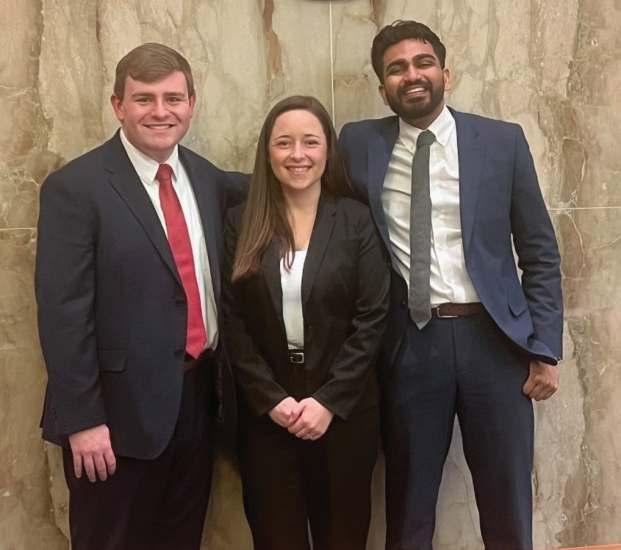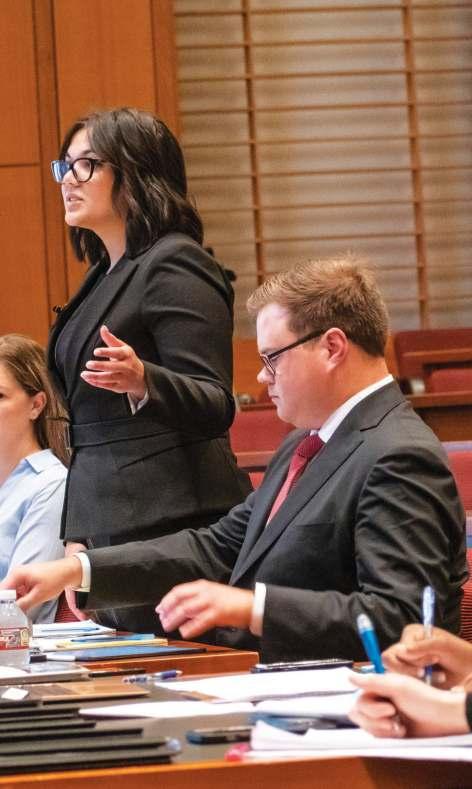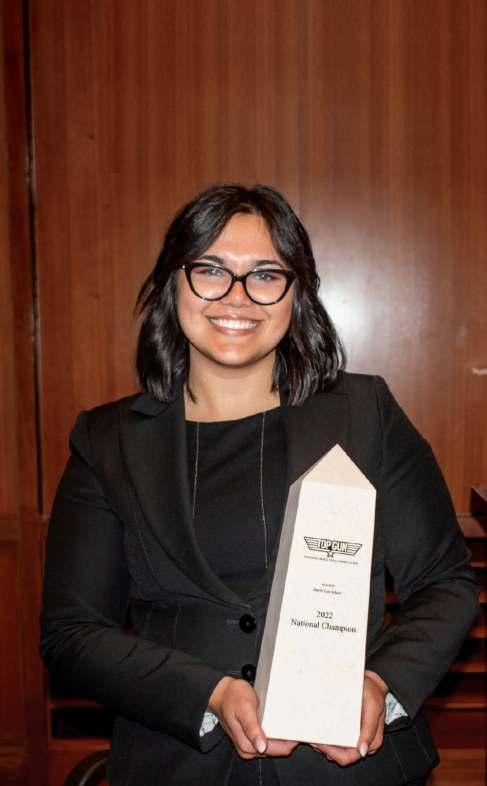
2 minute read
EDUCATION IN ACTION
Advocacy
The University of Georgia School of Law’s accomplished Moot Court and Mock Trial programs have amassed 12 national, 11 regional, and 3 state titles over the last five years. These programs focus directly on developing critical oral and written advocacy skills that will withstand the intense scrutiny of a court or jury. Through this incredible practical skills experience, our law students become powerful advocates.
Advertisement
Participating on a Moot Court team provides our students the opportunity to draft briefs and present oral arguments, appear before federal and state jurists, and travel to local, regional, national and international competitions. Our Moot Court program is supported by dedicated faculty members and Moot Court alumni and alumnae who volunteer to judge practice rounds of oral arguments.


Members of the law school’s Mock Trial teams deliver opening statements, conduct witness examinations and present closing arguments in the presence of a judge and jury. The Mock Trial program receives strong support from faculty members and Mock Trial alumni and alumnae who dedicate long hours to bench practice rounds, critiquing student arguments and offering suggestions for improvement. This level of support truly benefits our students and helps them to develop the courtroom skills they will need during their legal careers.
TO LEARN MORE ABOUT THE WINNING HISTORY OF MOOT COURT AND MOCK TRIAL TEAMS, VISIT www.law.uga.edu/advocacy


Business Law And Ethics Program
The University of Georgia School of Law’s Business Law and Ethics Program provides our students significant opportunities to study and engage with the legal concepts and ethical issues confronting attorneys and business leaders in today’s dynamic and global economy. The program includes traditional doctrinal courses, practice-based courses that link legal theory to the practice of law, and experiential learning opportunities such as the Business Law Clinic and Corporate Counsel Externship. These experiential learning opportunities, together with our negotiations team, have a particular focus on transactional practice and are a key element of the program. In and out of the classroom, our students practice essential skills such as negotiation, contract drafting, critical thinking, counseling, and creative problem-solving. As students practice these skills, our Business Law and Ethics Program maintains a strong emphasis on business ethics, particularly with respect to the attorney’s role in advising business clients.
The Corsair Law Society is an organization for high achieving students at the School of Law who are interested in pursuing careers in business law. The Society seeks to leverage the law school’s national presence to provide students with career opportunities across the country. A network of alumni, alumnae, and friends of the law school in cities throughout the United States serve as advisers and advocates for these students. Students also engage in discussions and learning opportunities with law students, business students, and professionals to enhance their understanding of corporate legal matters.
TO LEARN MORE, VISIT www.law.uga.edu/business-law-and-ethics-program
Negotiation Team
The Negotiation Team represents the University of Georgia School of Law at regional and national competitions in dealmaking and dispute resolution. Students join the team through a selective process that includes an intramural competition held every Fall.

Negotiating simulated deals and disputes, team members develop fundamental advocacy and counseling skills for collaborative and competitive settings. Training is experiential and focuses on practical skills grounded in fields that include game theory, alternative dispute resolution, influence, persuasion, behavioral economics, and psychology.
TO LEARN MORE, VISIT www.law.uga.edu/negotiation-transactionalcompetitions
Journals
Legal journals provide students the opportunity to enhance legal writing skills beyond the classroom experience. Our students publish four highly regarded journals:
• Georgia Criminal Law Review
• Georgia Law Review

• Georgia Journal of International & Comparative Law
• Journal of Intellectual Property Law
These journals, which are frequently cited by federal and state courts, textbooks, treatises and other law reviews, follow the customary format with articles from leading scholars and practitioners comprising the bulk of the content and another section consisting of student notes. Our journal participants can receive academic credit. Previous journal members have gone on to clerk for members of the federal judiciary, practice with the most respected firms in the nation, distinguish themselves in public service, and lead businesses.
TO LEARN MORE, VISIT www.law.uga.edu/journals










